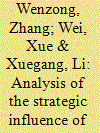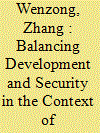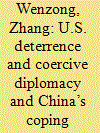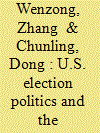| Srl | Item |
| 1 |
ID:
137446


|
|
|
| 2 |
ID:
190190


|
|
|
| 3 |
ID:
152182


|
|
|
|
|
| Summary/Abstract |
Deterrence and coercion are two kinds of strategies, the latter being more aggressive than the former. The U.S. Asia-Pacific Rebalancing strategy is an important diplomatic legacy of Obama’s administration. For the issues involving the Diaoyu Islands, the South China Sea, cyber security, DPRK’s nuclear program, and Iran’s nuclear program, the U.S. has carried out military deterrence and non-force coercion against China. But generally, these are low-level coercive measures and distinct from the severe economic sanction and diplomatic isolation imposed by the U.S. on Russia, Syria, DPRK and Iran in recent years. Concerning issues where the U.S. and China hold distinct views,there would be less strategic leeway for the two countries. If the U.S. is to strengthen deterrence and coercion towards China, China can respond more actively and effectively, but it will be more difficult to build a new model of China-U.S. major-country relationship.
|
|
|
|
|
|
|
|
|
|
|
|
|
|
|
|
| 4 |
ID:
148163


|
|
|
|
|
| Summary/Abstract |
The US and Cuba officially restored diplomatic relations on July 20, 2015, mending ties that had been broken for 54 years. It was a milestone event in international politics. This paper explores the reasons behind the US’s change of heart in its post-Cold War policy towards Cuba. It takes the perspective of US domestic politics and provides an overview of the process of resuming diplomatic relations. The authors believe that electoral considerations(i.e. to win the support of Cuban Americans in Florida in the presidential election) was not only the main reason for previous presidents—Bush Sr., Bill Clinton, and Bush Jr. —to tighten the Cuban embargo but is also a key reason why Obama healed ties with Havana. Diplomacy is an extension of domestic politics, but US domestic politics has been so deeply involved in the country’s policy on Cuba that it will play a very big part in the normalization of US-Cuban relations.
|
|
|
|
|
|
|
|
|
|
|
|
|
|
|
|